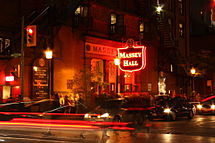- Massey Hall
-
Massey Hall 
Massey HallAddress 178 Victoria Street, Toronto, Ontario. Entrance is on Shuter Street. City Toronto, Ontario Country Canada Architect Sidney Badgley Owned by The Corporation of Massey Hall and Roy Thomson Hall Capacity 2,752 Type Historic property - Concert hall Opened 1894 Years active 1894-present National Historic Site of CanadaDesignated: 1981 http://www.masseyhall.com Massey Hall is a venerable performing arts theatre in the Garden District of downtown Toronto. The theatre originally was designed to seat 3,500 patrons but, after extensive renovations in the 1940s, now seats up to 2,765.[1]
Massey Hall and the more intimate Eaton Auditorium were the only substantial concert venues in Toronto before the opening of Roy Thomson Hall. For many years Massey Hall was the home of the Toronto Symphony Orchestra and the Toronto Mendelssohn Choir.
Massey Hall was designated a National Historic Site of Canada in 1981.[2][3]
Contents
History
Designed by architect Sidney Badgley, Massey Hall was completed in 1894 at a cost of $152,390.75.[4] Construction was financed by Hart Massey of Massey-Harris (later Massey Ferguson, before its ultimate principal shareholder director Conrad Black wound down its operations and retired its assets into the Varity Corporation) holding company. The hall's debut concert was on June 14, 1894. In 1933, the Massey Foundation undertook further renovations to the hall. It is currently used for a variety of events and is operated by the same corporation as Roy Thomson Hall.
Many dignitaries have attended the Hall since its inauguration. In 1901, the Duke and Duchess of Cornwall and York (the future King George V and his wife Queen Mary) visited with Canadian Prime Minister Wilfrid Laurier.
Many famous figures have appeared on the broad stage of this stately hall, including William Booth, Maria Callas, Enrico Caruso, Winston Churchill, George Gershwin, Glenn Gould, Dalai Lama, Gordon Lightfoot, Luciano Pavarotti, Oscar Peterson, and Arturo Toscanini.
It was the site of the legendary Charlie Parker-Dizzy Gillespie concert, recorded as Jazz at Massey Hall, in May 1953. Accompanying Gillespie and Parker in this acoustically sound hall were Bud Powell, Max Roach and Charles Mingus.
Rush, in June 1976, recorded the live album All the World's a Stage here.
Neil Young performed and recorded his concert, on January 19, 1971, which was later released as a live album, entitled Live at Massey Hall 1971.
On January 8, 1995, Ronnie Hawkins celebrated his 60th birthday by throwing a concert here, which was documented on the album, Let It Rock. The concert featured performances by Hawkins, Carl Perkins, Jerry Lee Lewis, The Band and Larry Gowan. Jeff Healey sat in on guitar for most, if not all, of the performances. Hawkins' band, The Hawks, or permutations of it, backed most, if not all, of the acts. All of the musicians performing that night were collectively dubbed "The Rock ‘N’ Roll Orchestra".
Notability
In 1975, Toronto City Council designated Massey Hall a "Heritage Property" under the province's Ontario Heritage Act.
In 1994, to commemorate the Hall's 100th anniversary, the basement was completely refurbished to include Centuries, a fully stocked bar. Prior to this addition, alcohol was not permitted in the hall. The decor of Centuries includes hundreds of photos of artists who have performed there over the years (largely collecting portraits of popular music stars since the eighties) including many autographs. Centuries has a capacity of 220 people, and often hosts CD release parties and post-show parties for the visiting artists. Roughly five years after Centuries was created, an additional bar in the balcony lounge was added.
At some point in its renovation history, three of the windows at the front of the venue were converted into doors, and a pair of fire escape staircases were installed along the front face of the building. The doors at the front of the venue were painted red (from their earlier brown-gold colour), a large neon sign was hung above the main entrance, and notice boards listing upcoming acts were revamped on either side of those doors.
Design Purpose and Inspiration
Massey Hall was built due to the need for a secular meeting place in which people from Toronto and area could meet and enjoy choral music not of a religious theme. It was designed with a neoclassical facade, and features moorish arches that span the width of the interior hall. This interior was inspired by the Alhambra Place in Spain as well as Louis Sullivan’s Chicago Auditorium and Opera house.[5] The exterior neoclassical facade was a preference voiced from Lillian, Hart Massey's daughter.
See also
References
- ^ Kilbourn, William. Intimate Grandeur: One Hundred Years At Massey Hall. Toronto: Stoddart Publishing Co. Limited, 1993.
- ^ Massey Hall, Directory of Designations of National Historic Significance of Canada
- ^ Massey Hall, National Register of Historic Places
- ^ Mollie Gillen (1965). The Masseys: Founding Family
- ^ Kilbourn, William. Intimate Grandeur: One Hundred Years At Massey Hall. Toronto: Stoddart Publishing Co. Limited, 1993.
- Venues. October 2010.
Coordinates: 43°39′15″N 79°22′44.50″W / 43.65417°N 79.379028°W
External links
Protected areas in Ontario National parks Provincial parks Conservation areas Boyd · Claireville · Cold Creek · Guelph Lake · Heber Down · Kortright Centre · Lake Laurentian · Mer Bleue · Mount Nemo · Rattlesnake Point · Spencer Gorge / Webster's Falls · more...UNESCO Biosphere Reserves Georgian Bay Littoral · Long Point · Niagara Escarpment (including Cheltenham Badlands) · Thousand Islands - Frontenac Arch · Wasaga BeachNational Historic Sites of Canada Central Experimental Farm · Dundurn Castle · Laurier House · Massey Hall · Montgomery's Tavern · Osgoode Hall · Parliament · Rideau Canal · Rideau Hall · more...Other areas  National Historic Sites of Canada by location
National Historic Sites of Canada by locationProvinces Territories Northwest Territories · Nunavut · YukonOther countries France Category ·
Category ·  Portal ·
Portal ·  WikiProjectCategories:
WikiProjectCategories:- Concert halls in Canada
- Music venues in Toronto
- Theatres in Toronto
- Event venues established in 1894
Wikimedia Foundation. 2010.



